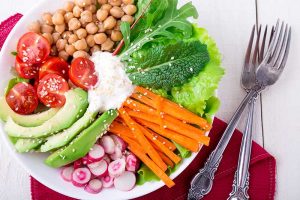Courtesy of Pulling Down the Moon Holistic Health
Article by Margaret Wertheim, MS, RD, LDN
There is clear evidence that a healthy body weight maximizes fertility and IVF success rates, but when it comes to specific foods or vitamins and minerals, the evidence gets a little murkier. There are a number of reasons for that, but perhaps the most important reason is that diet changes don’t happen in a vacuum; you can’t change one thing in a person’s diet without something else changing. For example, if you decrease the carbs while keeping the calories the same, the fat and/or protein in the diet must increase. In the era of evidence-based medicine, nutrition recommendations to support fertility aren’t always clear-cut. I can’t say “eat almonds, and you’ll definitely get pregnant,” but I do know if you eat healthier you’ll probably feel better, have more energy and it may help you get pregnant.

- Follow a Mediterranean diet pattern. Following a Mediterranean diet pattern may increase the chance of pregnancy when undergoing IVF, according to a 2010 study in the journal Fertility and Sterility. The Mediterranean diet pattern is characterized by high intake of vegetables and plant oils like olive oil, fish and legumes. In this study, women who were most adherent to a Mediterranean diet pattern were 40 percent more likely to become pregnant via IVF than women who were less adherent to this pattern. The authors suggest that the higher intakes of folate and vitamin B6 in the more adherent group may explain the benefit of the Mediterranean diet on pregnancy.
- Focus on Nutrient Density. Nutrient density means that you want to try to get as many vitamins and minerals as you can from the food you’re eating. This means the grains you eat should be whole grains. For example, experiment with different types of bread. “Whole wheat” bread that is really soft and spongy is probably not made from 100 percent whole grains, and thus isn’t as nutrient dense. The refining process in taking whole wheat to white flour strips the wheat of valuable fiber, protein, vitamin E and B-vitamins like folate. Try sprouted or 100 percent whole grain bread as well as other whole grains like brown rice, quinoa, millet and oats. Other nutrient-dense foods are legumes, nuts and seeds, fruits and vegetables along with appropriate portions of high-quality meat, fish and dairy. The idea is to minimize empty calories found in sodas, sweetened beverages and desserts. They offer only calories and sugar, which may cause unwanted weight gain, low energy levels and also may negatively affect your mood.
- Eat a wide variety of different colors. Research indicates that oxidative stress may play a role in endometriosis, PCOS, male factor and unexplained infertility. Increasing dietary antioxidants may help to offset this increased oxidative stress. Many vitamins and minerals have antioxidant functions including vitamins A, C and E and minerals like zinc and selenium. Does this mean you should start popping supplements of these vitamins and minerals? Not without the recommendation of a qualified nutritionist or health care professional that understands when it’s appropriate to supplement and when it’s not. More is not always better when it comes to supplements. Instead, focus on food.

While I can’t tell you that eating specific foods is absolutely going to improve your fertility, a nutrient-poor diet is definitely not going to help. I’ve worked with many people who expressed their initial reluctance to schedule a nutrition appointment and then had a change of heart. One woman told me, “What’s the worst thing that’s going to happen from my changing my diet? Am I going to feel a lot better? That works for me!” This attitude always makes me smile. I find it inspiring to work with women who are really trying and succeeding in improving their fertility by hitting it from all angles: exercise, nutrition, acupuncture, stress management and relaxation in order to really maximize their chances of natural conception or success with ART.
References:
- Vujkovic, et al. The preconception Mediterranean dietary pattern in couples undergoing in vitro fertilization/intracytoplasmic sperm injection treatment increases the chance of pregnancy. Fertility and Sterility. 2010;94(6):2096-2101.
2. Ruder, et al. Oxidative stress and antioxidants. Human Reproduction Update. 2008;14(4):345-357.
3. Mendiola, et al. A low intake of antioxidant nutrients is associated with poor semen quality in patients attending fertility clinics. Fertility and Sterility. 2010;93(4):1128-1133.
Pulling Down the Moon is a unique place of community and holistic healing for women and couples trying to conceive a child.




